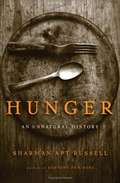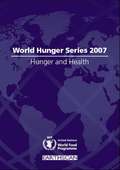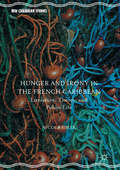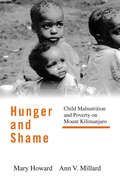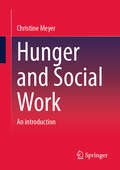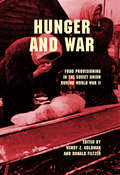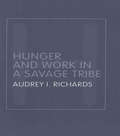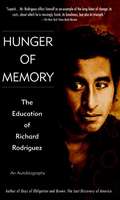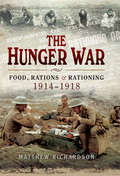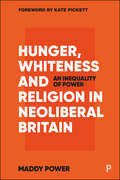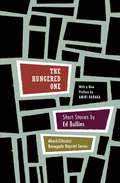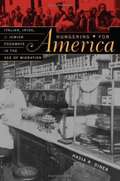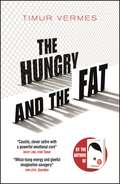- Table View
- List View
Hunger
by Barbara Milbauer Gerald LeinwandThis book studies the millions of Americans trapped in a self-perpetuating state of poverty and malnutrition, whose only hope for the future has become tangled in political red tape.
Hunger: An Unnatural History
by Sharman Apt RussellA subject as big as history and as everyday as skipping lunch -- how does hunger work? -- is explored in this thought-provoking, kaleidoscopic blend of science, anthropology, and personal reflection.
Hunger and Health: World Hunger Series 2007
by United Nations World Food ProgrammeHunger and Health explores the multiple relationships between hunger and poor health, and how they affect the growth of individuals, physiologically and psychologically, constraining the development of nations both socially and economically. Examining the profound effect that hunger has on health, including disease prevention and treatment, it gives special attention to access to quality food and healthcare, in particular for the marginalized and poor. It also identifies critical junctures in the human life cycle when the benefits of reducing hunger and improving poor health have a profound impact. It demonstrates how aligning of hunger and health interventions can offer proven solutions that reach those most in need, and contains compelling evidence which confirms that hunger and poor health are solvable problems today. It encourages those involved in policy, programming and advocacy to take action to address some of the most urgent hunger and health problems. Essential reading for anyone concerned about eliminating hunger. Published with the UN World Food Programme.
Hunger and Irony in the French Caribbean: Literature, Theory, and Public Life (New Caribbean Studies)
by Nicole SimekThrough a series of case studies spanning the bounds of literature, photography, essay, and manifesto, this book examines the ways in which literary texts do theoretical, ethical, and political work. Nicole Simek approaches the relationship between literature, theory, and public life through a specific site, the French Antillean islands of Guadeloupe and Martinique, and focuses on two mutually elucidating terms: hunger and irony. Reading these concepts together helps elucidate irony’s creative potential and limits. If hunger gives irony purchase by anchoring it in particular historical and material conditions, irony also gives a literature and politics of hunger a means for moving beyond a given situation, for pushing through the inertias of history and culture.
Hunger and Poverty in South Africa: The Hidden Faces of Food Insecurity (Routledge Studies in African Development)
by Jacqueline HanomanHunger and Poverty in South Africa: The Hidden Faces of Food Insecurity explores food insecurity as an issue of socioeconomic, political, cultural and environmental inequity and inequality. Based on extensive original research in Free State Province, South Africa, the book explores how people living in poverty make meaning of their food circumstances within the socio-cultural, political and economic contexts of post-apartheid South Africa, how they view the government’s food security policies and programs and their perceived agency to affect change. The personal narratives contained in the book show that food insecurity is shaped by many issues, among which are structural poverty, racism, attempts or non-attempts at reconciliation during and after apartheid, public health issues such as HIV/AIDS, and environmental circumstances. At a time when most discourse around food insecurity focuses on how to provide more food to people facing hunger, this book's multidimensional approach is a valuable contribution to the contemporary dialogue on poverty, food security/insecurity, sustainability and democratic agency both within South Africa and around the world. This book will be of interest to researchers in the areas of food security, multidimensional poverty, democratic agency and sustainable development, both in South Africa and internationally.
Hunger and Shame: Child Malnutrition and Poverty on Mount Kilimanjaro
by Mary Howard Ann V. MillardIn discussing the moral and practical dilemmas posed by the malnourished children in Mount Kilimanjaro, the authors explore the shame associated with child hunger in relation to social organization, colonial history and global economy.
Hunger and Social Work: An introduction
by Christine MeyerThe textbook offers an introduction to the elementary connection between social work and the human need for food. At present, hunger as a basic human need has become a secondary issue in social work, although the two are constitutively linked. The tasks of social work lie in the fulfilment of basic human needs, especially in its historical predecessors. For the first time, this introduction provides an overview of the multi-layered aspects of social work with regard to satisfying the need for hunger in socio-historical terms and in various constellations of social work, and also focuses on the abuse of power in educational contexts. Depending on social developments and the resulting life situations, hunger and food poverty are recurring major challenges and as such must be integrated into socio-educational thinking and reflected in action. This textbook provides contexts and suggestions for new approaches in this area.
Hunger and War
by Donald A. Filtzer Wendy Z. GoldmanDrawing on recently released Soviet archival materials, Hunger and War investigates state food supply policy and its impact on Soviet society during World War II. It explores the role of the state in provisioning the urban population, particularly workers, with food; feeding the Red army; the medicalization of hunger; hunger in blockaded Leningrad; and civilian mortality from hunger and malnutrition in other home front industrial regions. New research reported here challenges and complicates many of the narratives and counter-narratives about the war. The authors engage such difficult subjects as starvation mortality, bitterness over privation and inequalities in provisioning, and conflicts among state organizations. At the same time, they recognize the considerable role played by the Soviet state in organizing supplies of food to adequately support the military effort and defense production and in developing policies that promoted social stability amid upheaval. The book makes a significant contribution to scholarship on the Soviet population's experience of World War II as well as to studies of war and famine.
Hunger and Work in a Savage Tribe: A Functional Study of Nutrition Among the Southern Bantu (Routledge Classic Ethnographies)
by Audrey RichardsHunger and Work in a Savage Tribe examines the cultural aspects of food and eating among the Southern Bantu, taking as its starting point the bold statement 'nutrition as a biological process is more fundamental than sex'. When it was first published in 1932, with a preface by Malinowski, it laid the groundwork for sociological theory of nutrition. Richards was also among the first anthropologists to establish women's lives and the social sphere as legitimate subjects for anthropological study.
Hunger and Work in a Savage Tribe: A Functional Study of Nutrition among the Southern Bantu
by Audrey I. RichardsThe force of hunger in shaping human character and social structure has been largely overlooked. This omission is a serious one in the study of primitive society, in which starvation is a constant menace. This work remedies this deficiency and opens up new lines of anthropological inquiry. The whole network of social institutions is examined which makes possible the consumption, distribution, and production of food-eating customs, as well as the religion and magic of food-production.
The Hunger Games: Spectacle, Risk and the Girl Action Hero (Cinema and Youth Cultures)
by Catherine Driscoll Alexandra HeatwoleThe 2012 film The Hunger Games and its three sequels, appearing quickly over the following three years, represent one of the most successful examples of the contemporary popularity of youth-oriented speculative film and television series. This book considers "The Hunger Games" as an intertextual field centred on this blockbuster film franchise but also encompassing the successful novels that preceded them and the merchandised imagery and the critical and fan discourse that surrounds them. It explores the place of The Hunger Games in the history of youth-oriented cinema; in the history of speculative fiction centred on adolescents; in a network of continually evolving and tightly connected popular genres; and in the popular history of changing ideas about girlhood from which a successful action hero like Katniss Everdeen could emerge.
Hunger In The Balance
by Jennifer ClappFood aid has become a contentious issue in recent decades, with sharp disagreements over genetically modified crops, agricultural subsidies, and ways of guaranteeing food security in the face of successive global food crises. In Hunger in the Balance, Jennifer Clapp provides a timely and comprehensive account of the contemporary politics of food aid, explaining the origins and outcomes of recent clashes between donor nations-and between donors and recipients. She identifies fundamental disputes between donors over "tied" food aid, which requires that food be sourced in the donor country, versus "untied" aid, which provides cash to purchase food closer to the source of hunger. These debates have been especially intense between the major food aid donors, particularly the European Union and the United States. Similarly, the EU's rejection of GMO agricultural imports has raised concerns among recipients about accepting GMO foodstuffs from the United States. For the several hundred million people who at present have little choice but to rely on food aid for their daily survival, Clapp concludes, the consequences of these political differences are profound.
Hunger Of Memory: The Education Of Richard Rodriguez
by Richard RodriguezHunger of Memory is the story of Mexican-American Richard Rodriguez, who begins his schooling in Sacramento, California, knowing just 50 words of English, and concludes his university studies in the stately quiet of the reading room of the British Museum. Here is the poignant journey of a "minority student" who pays the cost of his social assimilation and academic success with a painful alienation - from his past, his parents, his culture - and so describes the high price of "making it" in middle-class America. Provocative in its positions on affirmative action and bilingual education, Hunger of Memory is a powerful political statement, a profound study of the importance of language . . . and the moving, intimate portrait of a boy struggling to become a man. From the Paperback edition. Note: The author uses British punctuation.
Hunger of Memory: An Autobiography
by Richard RodriguezHere is the poignant journey of a "minority student" who pays the cost of his social assimilation and academic success with a painful alienation -- from his past, his parents, his culture -- and so describes the high price of "making it" in middle-class America.
Hunger Pains: Life inside Foodbank Britain
by Kayleigh GarthwaiteWINNER OF THE BRITISH ACADEMY PETER TOWNSEND PRIZE 2017 Welcome to Foodbank Britain, where emergency food provision is an increasingly visible and controversial feature of ongoing austerity. We know the statistics, but what does it feel like to be forced to turn to foodbanks for help? What does it take to get emergency food, and what's in the food parcel? Kayleigh Garthwaite conducted hundreds of hours of interviews while working in a Trussell Trust foodbank. She spoke to people like Anna and her 11 year old daughter Daisy who were eating out of date food since Anna left her job due to mental health problems. Glen explained the shame he felt using the foodbank having taken on a zero hours contract. Pregnant Jessica walked two miles to the foodbank because she couldn't afford public transport. This provocative book provides a much needed voice for foodbank users and volunteers in the UK, and a powerful insight into the realities of foodbank use from the inside.
The Hunger War: Food, Rations & Rationing 1914-1918
by Matthew RichardsonA fascinating study of the role that food—and the lack of it—played in the First World War, for both troops and civilians. In the First World War, the supply of food to civilians became as significant a factor in final victory as success or defeat on the battlefields. Never before had the populations of entire countries lived under siege conditions, yet this extraordinary situation is often overlooked as a decisive factor in the outcome of the conflict. Matthew Richardson, in this highly readable and original comparative study, looks at the food supply situation on the British, German, French, Russian, and Italian home fronts, as well as on the battlefields. His broad perspective contrasts with some narrower approaches to the subject, and brings a fresh insight into the course of the war on all the major fronts. He explores the causes of food shortages, as well as the ways in which both combatant and neutral nations attempted to overcome them. He also looks at widely differing attitudes towards alcohol during the war, the social impacts of food shortages, and the ways in which armies attempted to feed their troops in the field. Includes photos
Hunger, Whiteness and Religion in Neoliberal Britain: An Inequality of Power
by Maddy PowerExploring why food aid exists and the deeper causes of food poverty, this book addresses neglected dimensions of traditional food aid and food poverty debates. It argues that the food aid industry is infused with neoliberal governmentality and shows how food charity upholds Christian ideals and white privilege, maintaining inequalities of class, race, religion and gender. However, it also reveals a sector that is immensely varied, embodying both individualism and mutual aid. Drawing upon lived experiences, it documents how food sharing amid poverty fosters solidarity and gives rise to alternative modes of food redistribution among communities. By harnessing these alternative ways of being, food aid and communities can be part of movements for economic and racial justice.
The Hungered One: Short Stories (AkashiClassics: Renegade Reprint Series)
by Ed Bullins"A richness of language and observation pervades this collection of short stories by a black writer about real black people."--The New York Times Book ReviewThese early writings from award-winning playwright Ed Bullins explore loneliness and despair in beautifully crafted stories.Ed Bullins has written numerous plays and fiction, including In the Wine Time, Goin' a Buffalo, Clara's Ole Man, and The Taking of Miss Janie, which received the New York Drama Critics Circle Award for Best American Play of the 1974-1975 season. His book of short fiction, The Hungered One: Early Writings, was originally published in 1971.
Hungering for America: Italian, Irish, and Jewish Foodways in the Age of Migration
by Hasia R. DinerMillions of immigrants were drawn to American shores, not by the mythic streets paved with gold, but rather by its tables heaped with food. How they experienced the realities of America’s abundant food—its meat and white bread, its butter and cheese, fruits and vegetables, coffee and beer—reflected their earlier deprivations and shaped their ethnic practices in the new land. Hungering for America tells the stories of three distinctive groups and their unique culinary dramas. Italian immigrants transformed the food of their upper classes and of sacred days into a generic “Italian” food that inspired community pride and cohesion. Irish immigrants, in contrast, loath to mimic the foodways of the Protestant British elite, diminished food as a marker of ethnicity. And East European Jews, who venerated food as the vital center around which family and religious practice gathered, found that dietary restrictions jarred with America’s boundless choices. These tales, of immigrants in their old worlds and in the new, demonstrate the role of hunger in driving migration and the significance of food in cementing ethnic identity and community. Hasia Diner confirms the well-worn adage, “Tell me what you eat and I will tell you what you are.”
Hungering for America: Italian, Irish, and Jewish Foodways in the Age of Migration
by Hasia R. DinerMillions of immigrants were drawn to American shores, not by the mythic streets paved with gold, but rather by its tables heaped with food. How they experienced the realities of America's abundant food--its meat and white bread, its butter and cheese, fruits and vegetables, coffee and beer--reflected their earlier deprivations and shaped their ethnic practices in the new land. Hungering for America tells the stories of three distinctive groups and their unique culinary dramas. Italian immigrants transformed the food of their upper classes and of sacred days into a generic "Italian" food that inspired community pride and cohesion. Irish immigrants, in contrast, loath to mimic the foodways of the Protestant British elite, diminished food as a marker of ethnicity. And, East European Jews, who venerated food as the vital center around which family and religious practice gathered, found that dietary restrictions jarred with America's boundless choices. These tales, of immigrants in their old worlds and in the new, demonstrate the role of hunger in driving migration and the significance of food in cementing ethnic identity and community. Hasia Diner confirms the well-worn adage, "Tell me what you eat and I will tell you what you are. "
Hungochani, Second Edition
by Marc EpprechtIn the tapestry of global queer cultures Africa has long been neglected or stereotyped. In Hungochani, Marc Epprecht seeks to change these limited views by tracing Southern Africa's history and traditions of homosexuality, modern gay and lesbian identities, and the vibrant gay rights movement that has emerged since the 1980s. Epprecht explores the diverse ways African cultures traditionally explained same-sex sexuality and follows the emergence of new forms of gender identity and sexuality that evolved with the introduction of capitalism, colonial rule, and Christian education. Using oral testimony, memoirs, literature, criminal court records, and early government enquiries from the eighteenth century to the present, he traces the complex origins of homophobia. By bringing forth a wealth of evidence about once-hidden sexual behaviour, Epprecht contributes to the honest, open discussion that is urgently needed in the battle against HIV/AIDS. Homosexuality - or hungochani as it is known in Zimbabwe - has been denounced by many politicians and church leaders as an example of how Western decadence has corrupted African traditions. However, a bold, new gay rights movement has emerged in several of the countries of the region since the 1980s, offering an exciting new dimension in the broad struggle for human rights and democracy unfolding on the continent. In a new preface to this edition, Epprecht considers the recent advances of equality on the continent such as the legalization of same-sex marriage in South Africa, as well as discriminatory setbacks such as Uganda's anti-homosexuality legislation.
Hungover: The Morning After and One Man's Quest for a Cure
by Shaughnessy Bishop-StallAs long as there have been hangovers, there have been attempts to get rid of them. The ancient Romans consumed owl eggs, the Mongolians sheep eyes, and the Syrians ground-up sparrow beaks. To this day, despite convenience-store shelves full of mass-marketed elixirs, a true antidote still eludes us. In Hungover: The Morning After and One Man’s Quest for a Cure, acclaimed journalist and witty raconteur Shaughnessy Bishop-Stall explores what happens to our bodies and minds when we over-imbibe and all the ways, over time and through different cultures, that we’ve tried to fix it. He delves into the infamous consequences of those rough mornings experienced by the greats of the past—from Noah to Churchill to pitcher David Wells—and reveals his own personal quest to find relief, and quite possibly his own cure. Hungover is an irresistible blend of culture, history, science, philosophy and mischievous humour. Part Simon Winchester, part Joshua Foer, part A. J. Jacobs and all Bishop-Stall, Hungover is both a lamentation and a celebration of a very human experience.
Hungry: Avocado Toast, Instagram Influencers, and Our Search for Connection and Meaning
by Eve Turow-Paul"Hungry is an excellent text about people&’s methods of adapting to modern life; it encompasses psychology, generational identities, and marketing in its considerations of contemporary society.&” —Foreword Reviews We wait in lines around the block for scoops of cookie dough. We photograph every meal. We visit selfie performance spaces and leave lucrative jobs to become farmers and craft brewers. Why? What are we really hungry for? In Hungry, Eve Turow-Paul provides a guided tour through the stranger corners of today's global food and lifestyle culture. How are 21st-century innovations and pressures are redefining people's needs and desires? How does "foodie" culture, along with other lifestyle trends, provide an answer to our rising rates of stress, loneliness, anxiety, and depression? Weaving together evolutionary psychology and sociology with captivating investigative reporting from around the world, Turow-Paul reveals the modern hungers—physical, spiritual, and emotional—that are driving today's top trends: The connection between the "death" of the cereal industry and access to work email on our smartphones How posting images of our dinners on social media both fulfills and feeds our hunger for human connection in an increasingly isolated world The ways "diet tribes" and boutique fitness gyms substitute for organized religion How access to round-the-clock news relates to the blowback against GMO foods Wellness retreats, astrology, plant parenthood, and other methods of easing modern anxiety Why "eating local" might be the key to solving not just climate change, but our current global sense of disconnection From gluten-free and Paleo diets to meal kit subscriptions, and from mukbang broadcast jockeys to craft beer, Hungry deepens our understanding of why we do what we do, and helps us find greater purpose and joy in today's technology-altered world.
The Hungry and the Fat: A bold new satire by the author of LOOK WHO'S BACK
by Timur VermesBy the author of LOOK WHO'S BACK, a radical and bold satire in inequitable times."Whizz-bang energy and gleeful imaginative savagery" Sam Leith, Guardian"More than mere satire, it's a book that engages deeply" Alex Preston, Financial Times"An immensely enjoyable read" Daniel Hahn, Spectator"A caustic, clever satire with a powerful emotional core" Becky Long, Irish Times"Satirical, sharp, believable . . . Brilliant" Rick O'Shea, RTEREFUGEE CAMPS IN AFRICA ARE SWELLINGAnd Europe has closed its borders. The refugees have no future, no hope, and no money to pay the vast sums now demanded by people smugglers. The only thing they have is time. AND THEN AN ANGEL ARRIVES FROM REALITY T.V.When model and star presenter Nadeche Hackenbusch comes to film at the largest of the camps, one young refugee sees a unique opportunity: to organise a march to Europe, in full view of the media. Viewers are gripped as the vast convoy moves closer, but the far right in Germany is regrouping and the government is at a loss. Which country will halt the refugees in their tracks? THE HUNGRY AND THE FATA devastating, close-to-the-knuckle satire about the haves and have-nots in our divided world by one of Europe's finest and most perceptive writers.Translated from the German by Jamie Bulloch
The Hungry and the Fat: A bold new satire by the author of LOOK WHO'S BACK
by Timur VermesBy the author of LOOK WHO'S BACK, a radical and bold satire in inequitable times."Whizz-bang energy and gleeful imaginative savagery" Sam Leith, Guardian"More than mere satire, it's a book that engages deeply" Alex Preston, Financial Times"An immensely enjoyable read" Daniel Hahn, Spectator"A caustic, clever satire with a powerful emotional core" Becky Long, Irish Times"Satirical, sharp, believable . . . Brilliant" Rick O'Shea, RTEREFUGEE CAMPS IN AFRICA ARE SWELLINGAnd Europe has closed its borders. The refugees have no future, no hope, and no money to pay the vast sums now demanded by people smugglers. The only thing they have is time. AND THEN AN ANGEL ARRIVES FROM REALITY T.V.When model and star presenter Nadeche Hackenbusch comes to film at the largest of the camps, one young refugee sees a unique opportunity: to organise a march to Europe, in full view of the media. Viewers are gripped as the vast convoy moves closer, but the far right in Germany is regrouping and the government is at a loss. Which country will halt the refugees in their tracks? THE HUNGRY AND THE FATA devastating, close-to-the-knuckle satire about the haves and have-nots in our divided world by one of Europe's finest and most perceptive writers.Translated from the German by Jamie Bulloch

